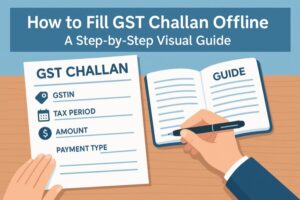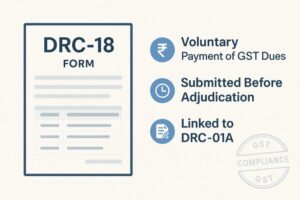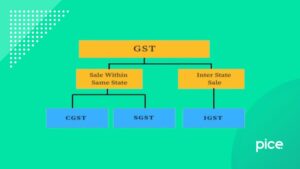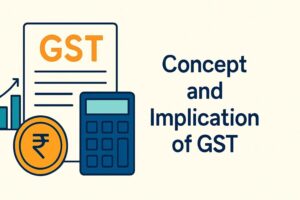Restriction of GSTR-1 Submission if GSTR-3B Remains Unfiled
- 21 Aug 24
- 11 mins

Restriction of GSTR-1 Submission if GSTR-3B Remains Unfiled
Key Takeaway
- Timely filing of GSTR-3B is crucial to avoid restrictions on filing the GSTR-1 Form.
- The Invoice Furnishing Facility (IFF) helps quarterly filers manage outward supplies efficiently.
- Rule 59(6) blocks GSTR-1 filing if GSTR-3B returns are not filed, enforcing compliance.
- Delays in filing can result in penalties, interest, and operational inefficiencies.
- Using automated reminders and compliance software can help businesses meet filing deadlines and maintain smooth operations.
Comprehensive Guide to GSTR-1 and IFF Filing Restrictions
In the realm of Goods and Services Tax (GST), compliance is paramount. Among the numerous compliance requirements, the filing of returns is crucial. Recently, the Government of India has introduced restrictions on the submission of GSTR-1 if GSTR-3B remains unfiled.
GSTR-1 Overview
GSTR-1 is a monthly or quarterly return that captures the details of all outward supplies made by a registered taxpayer. Accurate filing of the GSTR-1 Form ensures that sales details are correctly recorded and communicated to the GST authorities. Non-filing or incorrect filing of the GSTR-1 Form can lead to discrepancies in tax records, affecting both the taxpayer and the recipients of the supplies.
Invoice Furnishing Facility (IFF)
The Invoice Furnishing Facility (IFF) is a feature available for quarterly taxpayers under the QRMP (Quarterly Return Filing and Monthly Payment) scheme. It allows quarterly filers to furnish details of their outward supplies for the first two months of the quarter. This ensures that the buyers can claim Input Tax Credit (ITC) promptly without waiting for the end of the quarter.
Restrictions on Filing GSTR-1 and IFF
The government has put in place specific restrictions to ensure compliance with GST regulations. One of the key restrictions is that taxpayers cannot file GSTR-1 Form or use the IFF if they have not submitted their GSTR-3B Returns for the previous tax period.

This means that if GSTR-3B Returns are not filed, the registered taxpayer's ability to file the GSTR-1 Form for the subsequent month or subsequent quarters is blocked. This restriction aims to enforce timely filing and payment of taxes.
Implementation of Rule 59(6) on the GST Platform
Rule 59(6) was introduced to enhance the GST compliance mechanism. According to this rule, if a taxpayer fails to file GSTR-3B Returns for a particular tax period, their ability to file the GSTR-1 Form for the subsequent tax period is blocked. This measure aims to ensure that taxpayers do not neglect their GSTR-3B filing obligations.
The implementation of Rule 59(6) represents a significant shift in the GST filing process. This rule is designed to ensure timely filing of returns by taxpayers. Let's delve into the details of this rule and its impact on the GST portal for businesses.
FORM GSTR-3B Details
FORM GSTR-3B is a self-declared summary return filed monthly by regular taxpayers. It includes details of outward and inward supplies, as well as the tax liability. Filing GSTR-3B Returns is mandatory for businesses, serving as a mechanism to discharge their monthly tax liabilities.
Components of GSTR-3B Returns
- Outward Supplies: Details of all outward supplies made by the taxpayer, including taxable, exempt, and zero-rated supplies.
- Inward Supplies: Details of inward supplies on which tax is payable under reverse charge.
- Input Tax Credit (ITC): Information about ITC claimed on purchases and other eligible credits.
- Tax Liability: Calculation of tax liability based on outward and inward supplies.
- Payment of Taxes: Details of taxes paid and any adjustments made in the electronic cash ledger.
Filing Procedure
- Preparation: Gather all relevant data for outward and inward supplies.
- Computation: Calculate the tax liability and ITC for the period.
- Submission: Submit the GSTR-3B form on the GST portal before the due date.
- Payment: Ensure the tax liability is paid, either through ITC or cash.
Consequences of Failing to File GSTR-3B Returns
Failing to file GSTR-3B Returns has significant consequences. One of the most notable repercussions is the restriction on filing the GSTR-1 Form. When GSTR-3B Returns are not filed, the taxpayer's ability to file the GSTR-1 Form is blocked, disrupting the flow of information and compliance. This restriction can lead to several issues:

- Penalties and Interest: Non-filing of GSTR-3B Returns attracts penalties and interest on the outstanding tax amount. The longer the delay, the higher the penalties and interest accrued.
- ITC Reversal: Input Tax Credit claimed may need to be reversed if the GSTR-3B Returns are not filed, impacting the working capital and cash flow of the business.
- Compliance Rating: Persistent non-compliance can negatively affect the taxpayer’s compliance rating, which can have further implications, such as increased scrutiny from tax authorities.
- Operational Disruptions: Inability to file the GSTR-1 Form can disrupt business operations, as suppliers and buyers may face difficulties in reconciling their returns.
Available Solutions
To avoid these complications, it is imperative for taxpayers to ensure timely filing of GSTR-3B Returns. Here are some solutions:
- Automated Reminders: Setting up automated reminders and alerts for due dates can help businesses stay on track with their GST filings.
- Compliance Software: Using GST compliance software can streamline the filing process, reducing the risk of errors and delays. These tools can also automate data entry and reconciliation processes.
- Regular Reconciliation: Conduct regular reconciliation of invoices and returns to ensure that all data is accurate and up to date, which helps in timely filing.
- Training and Awareness: Ensure that the finance and accounting teams are well-trained and updated on GST compliance requirements and deadlines.
- Professional Support: Engage with GST consultants or professionals who can provide expert advice and support in managing GST compliance efficiently.
Can we file GSTR 1 before GSTR 3B
No, you cannot file GSTR-1 before GSTR-3B if the latter remains unfiled for the previous tax period. According to Rule 59(6) of the GST regulations, if a taxpayer fails to file GSTR-3B for a particular tax period, their ability to file GSTR-1 for the subsequent period is blocked. This rule aims to enforce compliance by ensuring that taxpayers meet their obligations to file both returns in a timely manner.
Why This Rule Exists
The restriction is designed to ensure that the registered person adheres to the overall GST compliance framework, as both GSTR-3B and GSTR-1 are critical components of the GST return filing process. GSTR-3B is a summary return that includes details of outward and inward supplies and tax liabilities, while GSTR-1 captures detailed information on outward supplies.
Compliance Enforcement
The GST council implemented Rule 59(6) to encourage regular and prompt filing of returns. This helps maintain accurate tax records and facilitates timely claim of Input Tax Credit (ITC) by buyers, reducing discrepancies and improving overall tax compliance.
Effects of Restricting GSTR-1 Filing
The restriction on filing the GSTR-1 Form if GSTR-3B Returns remain unfiled has significant implications for businesses. This measure, aimed at ensuring timely compliance, affects various aspects of business operations and tax management.
Disruption in Invoice Matching
One of the immediate effects of restricting GSTR-1 filing is the disruption in the invoice matching process. The GSTR-1 Form contains details of outward supplies which are used by the recipients to claim Input Tax Credit (ITC). If a business cannot file the GSTR-1 Form, their customers may face delays in claiming ITC, leading to cash flow issues and strained business relationships.
Cash Flow Issues
When the GSTR-1 Form filing is blocked, businesses may experience cash flow challenges. This is because the delay in filing the GSTR-1 Form can affect the reconciliation of sales and purchases, impacting the timely claim of ITC. Consequently, businesses might have to pay taxes in cash, affecting their working capital.
Penalties and Interest
The inability to file the GSTR-1 Form due to pending GSTR-3B Returns can result in penalties and interest for late filing. This adds to the financial burden on businesses, especially small and medium enterprises, who might already be struggling with compliance costs.
Compliance Rating
Persistent non-compliance with GST filing requirements can negatively impact a business’s compliance rating. A poor compliance rating can lead to increased scrutiny from tax authorities and potentially affect a business's reputation and credibility in the market.
Operational Inefficiencies
Blocked GSTR-1 Form filings can lead to operational inefficiencies as businesses spend additional time and resources to resolve compliance issues. This diversion of focus from core business activities can hinder growth and productivity.
Returns Subject to Blocking
Understanding which returns are subject to blocking is crucial for businesses to maintain compliance and avoid disruptions. The primary focus is on ensuring that GSTR-3B Returns are filed on time to prevent the blocking of the GSTR-1 Form.
GSTR-3B Returns
GSTR-3B Returns are self-declared summary returns that need to be filed monthly by regular taxpayers. They include details of outward and inward supplies, and tax liabilities. Timely filing of GSTR-3B Returns is essential to avoid restrictions on subsequent filings of the GSTR-1 Form.
GSTR-1 Form
The GSTR-1 Form is the monthly or quarterly return that captures the details of all outward supplies made by a registered taxpayer. This return is critical for the accurate reporting of sales data and for the recipients to claim ITC. Blocking of GSTR-1 Form filing occurs if the preceding period's GSTR-3B Returns are not filed.
IFF (Invoice Furnishing Facility)
Under the QRMP (Quarterly Return Filing and Monthly Payment) scheme, taxpayers can use the IFF to furnish details of outward supplies for the first two months of the quarter. Similar to the GSTR-1 Form, the IFF filing can also be restricted if the preceding GSTR-3B Returns are not filed.
Business Implications
The restriction on filing these returns has several business implications:
Cash Flow Constraints
Delayed ITC claims due to blocked GSTR-1 Form filings can result in cash flow constraints. Businesses might need to pay higher taxes upfront, affecting their liquidity and operational efficiency.
Supplier and Customer Relationships
Inability to file the GSTR-1 Form can lead to discrepancies and delays in invoice reconciliation, straining relationships with suppliers and customers. Businesses may face challenges in maintaining trust and smooth operations.
Increased Compliance Costs
Handling blocked returns and resolving compliance issues can increase administrative and compliance costs. Businesses might need to invest in additional resources or professional services to manage these challenges.
Strategic Planning
Businesses may need to adjust their strategic planning to ensure compliance with GST regulations. This includes setting up robust internal processes, leveraging technology for automation, and staying updated with regulatory changes.
 By
By 

















